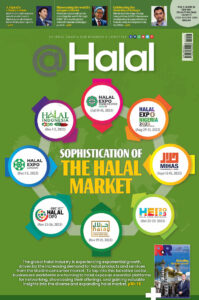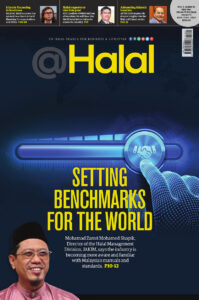The halal industry is one of the world’s fastest-growing sectors, with a projected value of over US$5 trillion by 2030. The industry’s growth can be attributed to the increasing number of Muslim populations worldwide and their willingness to pay a premium for halal-certified products.
The halal food industry has also attracted non-Muslim consumers looking for healthier and more ethical food options. As a result, many food and beverage companies have started offering halal-certified products to cater for this growing market segment. The impact seen in the food and beverage industry is also observed in other parts, including pharmaceuticals, cosmetics and the Islamic theme-entertainment, clothing and lifestyle.
In Malaysia, the significance of this industry cannot be understated, as it provides a substantial source of income and employment for the country. In 2018, the Halal Development Corporation Bhd (HDC) estimated that the industry contributed approximately 7.8 per cent to the country’s gross domestic product (GDP) and employed over 330,000 people.
By 2025, the halal industry will make up 8.1 per cent of the total Malaysian Gross Domestic Product (GDP). The halal industry is also very lucrative at the international level. With the world’s increasing appetite for halal products, the industry is poised for continued growth and expansion. It is estimated that there is currently an 80 per cent gap between the demand and production of global halal products.
It is not all green in the halal industry
While the growth of the halal industry is immensely encouraging, the increasing demand for halal products has led to a rise in fake certifications and non-compliant halalan toyyiban products being sold in the market, threatening the integrity and ‘wholesomeness’ hallmark of the industry.
The halal industry also faced environmental sustainability issues, waste management and animal welfare. Despite the zero-tolerance policy for animal abuse in Islam, this standard is not always upheld such that animal welfare is still being violated in industrial and cottage halal meat production.
In Malaysia, it is not unusual to observe farm animals being crammed into trucks and lorries. Chickens are often packed tightly in plastic crates and stacked on each other without food or water. Given the scenario being considered a mundane and run-of-the-mill issue for the halal industry, it is unfortunate that it fails to be the catalyst for reforming the animal welfare practices of the industry.
The wake-up call for the ethical practices and values in the halal industry was perhaps the 2020 meat cartel case involving RM30 million. While it was unearthed in December 2020, the case was reported to exist for several years, indicating systemic problems in the supply chain.
A meat cartel was found to be involved in unethical business practices of smuggling meat that was disguised as halal-certified meat. The investigation revealed corruption and bribery within the government agencies responsible for controlling the importation of halal meat.
This case raised serious questions about the quality and safety of the halal products being produced and sold to consumers. It underscores the need for greater transparency and accountability in the halal industry. It accentuates the need to invigorate values in the whole ecosystem of the halal industry.
SCRIPT – The vision of MADANI Malaysia
ENTER the MADANI Malaysia, a national framework that could potentially be used to humanise and instil values into the halal industry. SCRIPT is the English equivalent of MADANI, which stands for sustainability, care and compassion, respect, innovation, prosperity, and trust. The national framework SCRIPT was launched in January 2023 by Prime Minister Datuk Seri Anwar Ibrahim and aimed at leading Malaysia forward.
The vision for the SCRIPT framework is to create a sustainable, caring, respectful, innovative, prosperous, and trustworthy society in Malaysia, which are essential for building a thriving and dynamic future for the country. The vision of each element of SCRIPT is as follows:
• Sustainability – to build upon global standards to promote a new culture of sustainability in all aspects of life.
• Care and compassion – to reignite a caring and compassionate society within Malaysia.
• Respect – to forge a mutually respectful and just Malaysian society dedicated to inclusion, equality, integrity, and human dignity.
• Innovation – to promote a culture of innovation within Malaysian society.
• Prosperity – to create a prosperous Malaysia through balanced and sustainable economic growth, empowerment, and inclusivity of the citizenry, and due regard for the spiritual, holistic well-being of individuals, communities, and the nation.
• Trust – to restore and dignify trust within Malaysian society.
The SCRIPT framework is designed to tackle Malaysia’s present-day challenges and future prospects, considering the nation’s unique language, cultural norms, and beliefs. It incorporates traditional methods and cutting-edge techniques, ensuring a holistic solution to overcoming Malaysia’s obstacles. With its versatility, the SCRIPT framework may have the potential to be implemented across various industries, including the halal industry.
SCRIPT-ing to magnify the principles of the halal industry
The SCRIPT values of Sustainability, Care and Compassion, Respect, Innovation, Prosperity, and Trust are not new, but are universal values already inherent in the halal industry.
For example, the principle of trust is deeply ingrained in the halal industry. It is based on strict adherence to Islamic laws and regulations, promoting honesty, fairness, and transparency in all transactions. It is based on the following saying of Prophet Muhammad (peace and blessings be upon him):
“Fulfill the trust of those to whom they are due, and do not be treacherous to the one who betrays you.”
[Source: Sunan al-Tirmidhī 1264]
As a framework, SCRIPT could be positioned as a set of guidelines and principles that serve as a roadmap for decision-making and policy development to instil desired values, in this case, trust. SCRIPT framework could help magnify the embedded code of confidence in the halal industry through a planned and systematic approach.
By emphasising the importance of trust, the framework reinforces the value that has long been central to the halal industry across multiple halal sectors. By incorporating the SCRIPT values too, the halal industry’s focus is on providing high-quality halalan toyyiban products and promoting the well-being of individuals, communities, and the environment.
‘Out with the old, in with the new?’
The new SCRIPT framework should not be seen as overtaking and replacing the national halal framework. Instead, it can enhance and supplement existing policies and programmes for a more comprehensive approach to nation-building through the halal industry.
This integrated approach is necessary to maximise the potential impact of new and existing frameworks and to ensure the most effective use of resources and efforts. In general, the integration will help ensure that there is no loss of progress or valuable lessons learned and that the continuity of programmes and policies is maintained.
Malaysia has long prioritised the development of the halal industry through various national policies, including the second Halal Industry Master Plan (HIMP 2030). The main aim of HIMP 2030 is to boost Malaysia’s holistic growth in the Halal industry by leveraging its strengths.
The theme, “Prominent, Visible and Globalised Halal Malaysia”, showcases Malaysia’s aspirations to attain a prominent position in the global Halal industry. HIMP 2030 also seeks to promote a solid halal ecosystem in Malaysia, support local halal businesses, encourage research and development, enhance the halal certification process, and improve industry standards through innovative technologies and a strengthened regulatory framework.
The HIMP 2030 lays down seven strategic thrusts to develop a thriving halal industry in Malaysia:
• The first thrust is to enhance halal industry-friendly policy and legislation to create a favourable environment for businesses.
• The second is to create new and more significant market spaces for Malaysia’s halal products and services, making it easier for local companies to expand globally.
• The third thrust is to establish a larger pool of halal industry experts who can meet the growing needs of the global market.
• The fourth thrust is to enhance the quality and integrated infrastructure development of the halal industry, ensuring businesses have access to the latest technology and resources.
• The fifth thrust is to foster thought leadership.
• The sixth thrust is to produce more home-grown halal champions.
• The seventh and final thrust is facilitating more competitive bumiputera participation in the halal industry, promoting equality and inclusiveness.
HIMP 2030 is seen as a crucial step and a key driver for economic growth and job creation in the country, representing a clear vision for the future of the halal industry in Malaysia, attracting investment and talent to the sector. The HIMP 2030 plan
focuses on developing critical halal industry sectors such as food and beverage, pharmaceuticals, cosmetics and personal care, and others.
While HIMP 2030 provides a roadmap to accelerate halal industry advancement, it lacks a comprehensive focus to address the social and ethical implications in the industry. The SCRIPT framework could potentially be a valuable tool that enhances the existing halal framework by reorienting value-based approaches in the halal industry.
SCRIPT could complement this by emphasising the importance of sustainable, caring, and compassionate practices in the halal industry, as well as promoting innovation and trust within the industry. By integrating the values of SCRIPT with the HIMP 2030 plan, the halal industry in Malaysia can achieve a well-rounded and comprehensive development that benefits both the industry and the wider society.
This will not only increase the competitiveness of the Malaysian halal industry but also contribute to the overall growth and development of the country.
By Anis Najiha Ahmad, Yumi Zuhanis Has-Yun Hashim and Nurhidayu Al-saari, International Institute for Halal Research and Training (INHART), International Islamic University Malaysia.








